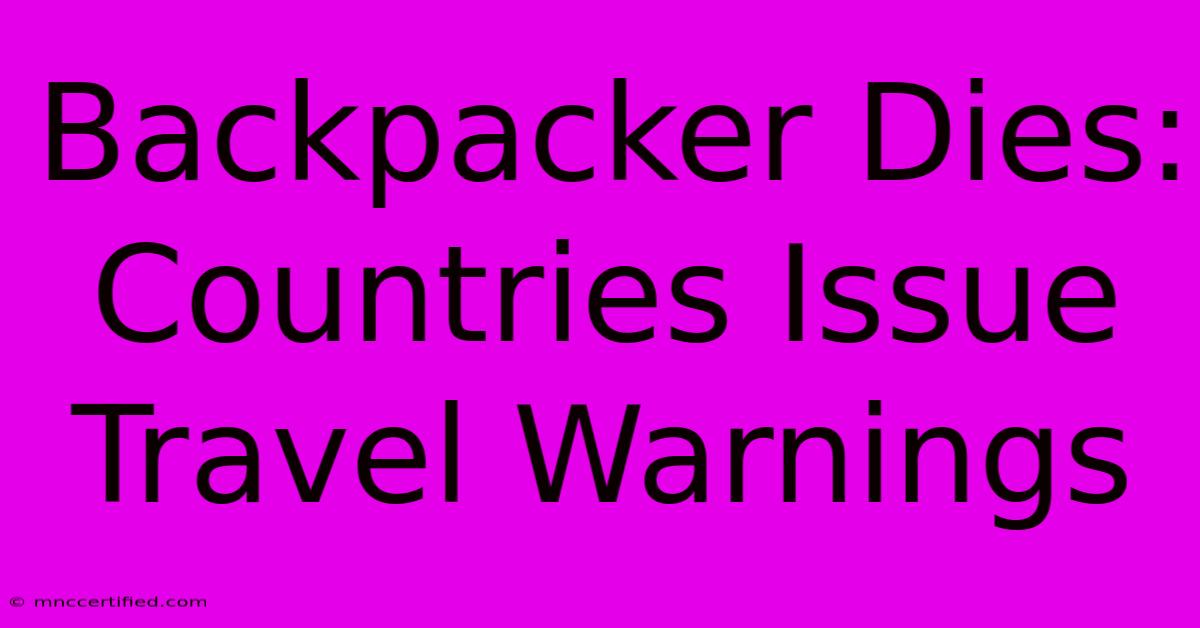Backpacker Dies: Countries Issue Travel Warnings

Table of Contents
Backpacker Dies: Countries Issue Travel Warnings
A recent tragedy involving a backpacker's death has prompted several countries to issue updated travel warnings, highlighting the importance of thorough pre-trip planning and awareness of potential risks while traveling abroad. This unfortunate incident underscores the need for heightened safety precautions and responsible travel practices.
The Incident: A Backpacker's Tragic Demise
While specific details surrounding the incident may be limited to protect the deceased's privacy and pending investigations, the core issue remains: a young backpacker tragically lost their life while traveling. The circumstances surrounding the death – whether it was an accident, illness, or foul play – will likely influence the nature and severity of travel warnings issued by various governments. News reports often omit crucial details during initial reporting to avoid misinformation.
Countries Issuing Travel Warnings: Increased Vigilance
Following the incident, several countries have updated their travel advisories. These updates often include:
- Increased risk assessments: Travel warnings may highlight an increased risk of certain dangers, such as petty theft, violent crime, or health-related issues, depending on the circumstances of the backpacker's death. Countries may specifically mention the region or areas where the incident occurred.
- Specific safety recommendations: Government advisories will likely provide practical advice to travelers, such as avoiding certain areas, taking extra safety precautions, registering with the embassy or consulate, and having reliable communication methods.
- Review of existing travel insurance: Backpackers are urged to review their travel insurance policies, ensuring sufficient coverage for medical emergencies, repatriation, and other unforeseen circumstances.
It's crucial to note that the specific countries issuing warnings and the nature of those warnings will vary. Regularly checking your government's travel advisory website before and during your trip is paramount. You should always consult official sources, such as your home country's foreign affairs or travel advisory website.
Safety Precautions for Backpackers: Minimizing Risks
This tragedy serves as a stark reminder of the potential dangers faced by backpackers. Taking proactive steps to ensure safety is vital. Here are some key recommendations:
Before Your Trip:
- Thorough Research: Research your destination extensively, including local laws, customs, potential health risks (consult your doctor!), and safe travel practices specific to the area.
- Share Your Itinerary: Share detailed travel plans with family and friends, including planned routes, accommodation details, and emergency contact information.
- Appropriate Insurance: Invest in comprehensive travel insurance that covers medical emergencies, evacuation, lost luggage, and other potential issues.
- Vaccinations and Medications: Consult your doctor about necessary vaccinations and medications for your destination.
During Your Trip:
- Stay Aware of Your Surroundings: Be vigilant and aware of your surroundings at all times. Avoid walking alone at night in unfamiliar areas.
- Secure Your Belongings: Take precautions to protect your belongings from theft. Avoid displaying expensive jewelry or electronics.
- Trust Your Instincts: If a situation feels unsafe, remove yourself from it immediately.
- Reliable Communication: Ensure you have a reliable way to communicate with others in case of an emergency. Consider a local SIM card or international roaming plan.
- Emergency Contacts: Keep a list of emergency contact numbers readily available, including local emergency services and your embassy or consulate.
Conclusion: Responsible Travel and Awareness
While backpacking offers incredible experiences, it's crucial to prioritize safety. The death of this backpacker serves as a solemn reminder of the importance of thorough preparation, responsible travel practices, and constant awareness of potential risks. By following these safety precautions and staying informed through official travel advisories, you can significantly reduce your risks and enjoy a safer and more fulfilling travel experience. Remember to check government travel advisories regularly – they are your best resource for up-to-date information.

Thank you for visiting our website wich cover about Backpacker Dies: Countries Issue Travel Warnings. We hope the information provided has been useful to you. Feel free to contact us if you have any questions or need further assistance. See you next time and dont miss to bookmark.
Featured Posts
-
Russia Fires Missile Into Ukraine
Nov 21, 2024
-
Ionic Bonds Worksheet Answer Key
Nov 21, 2024
-
Nvda Stock Live Updates Tomorrow
Nov 21, 2024
-
Bomb Cyclone Death Toll Rises 450 000 Displaced
Nov 21, 2024
-
Karschner Insurance Wellsboro Pa
Nov 21, 2024